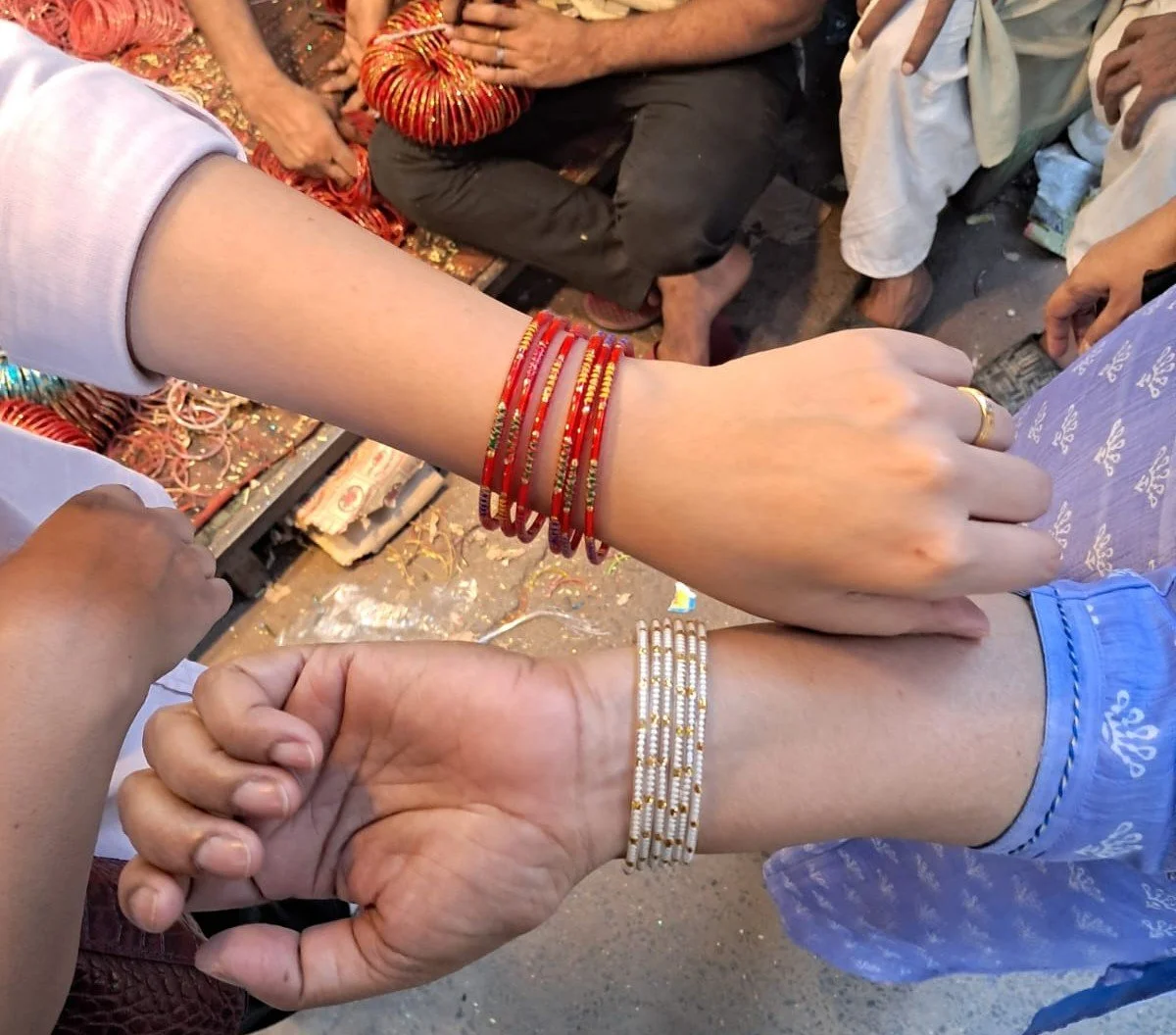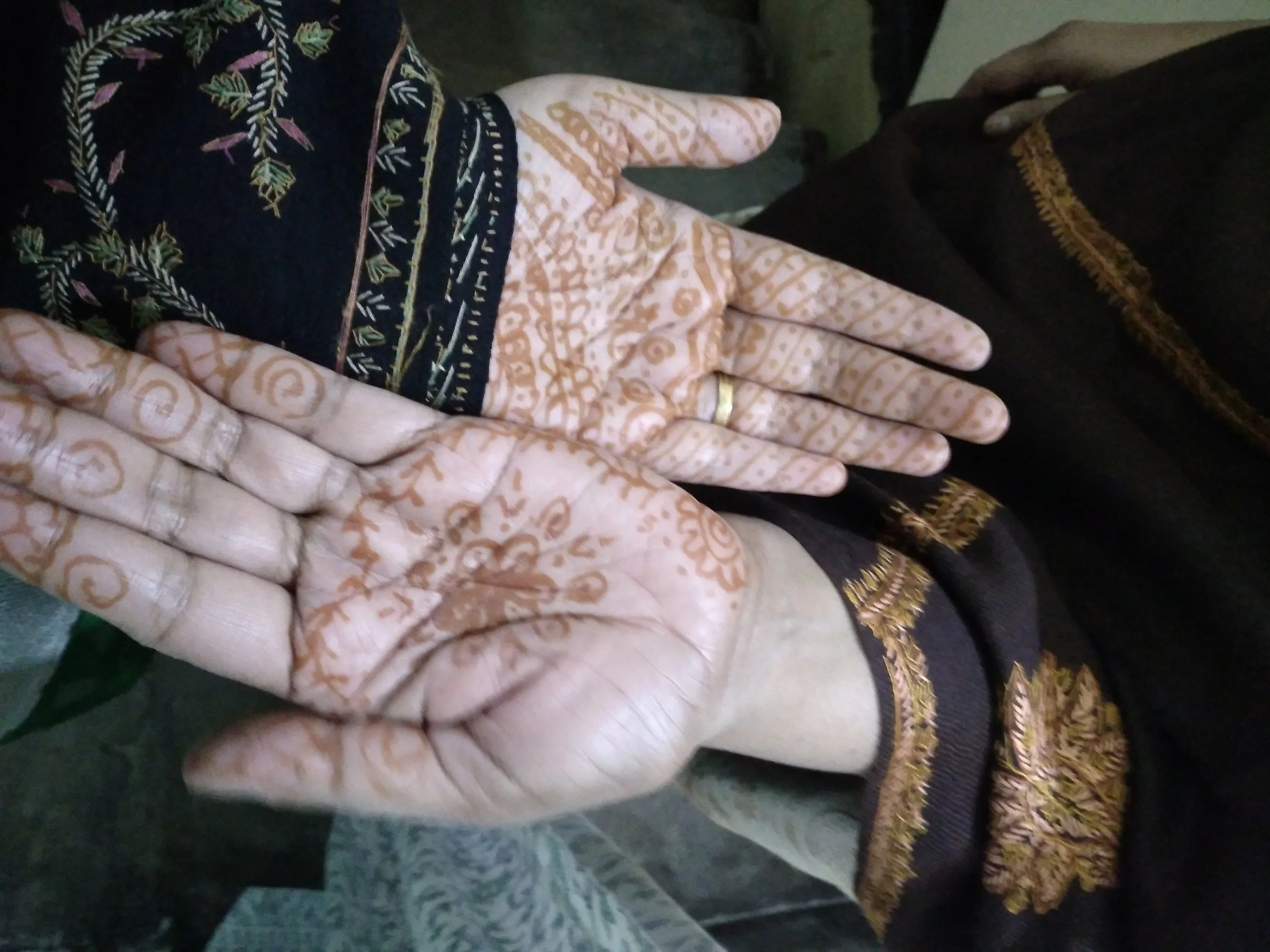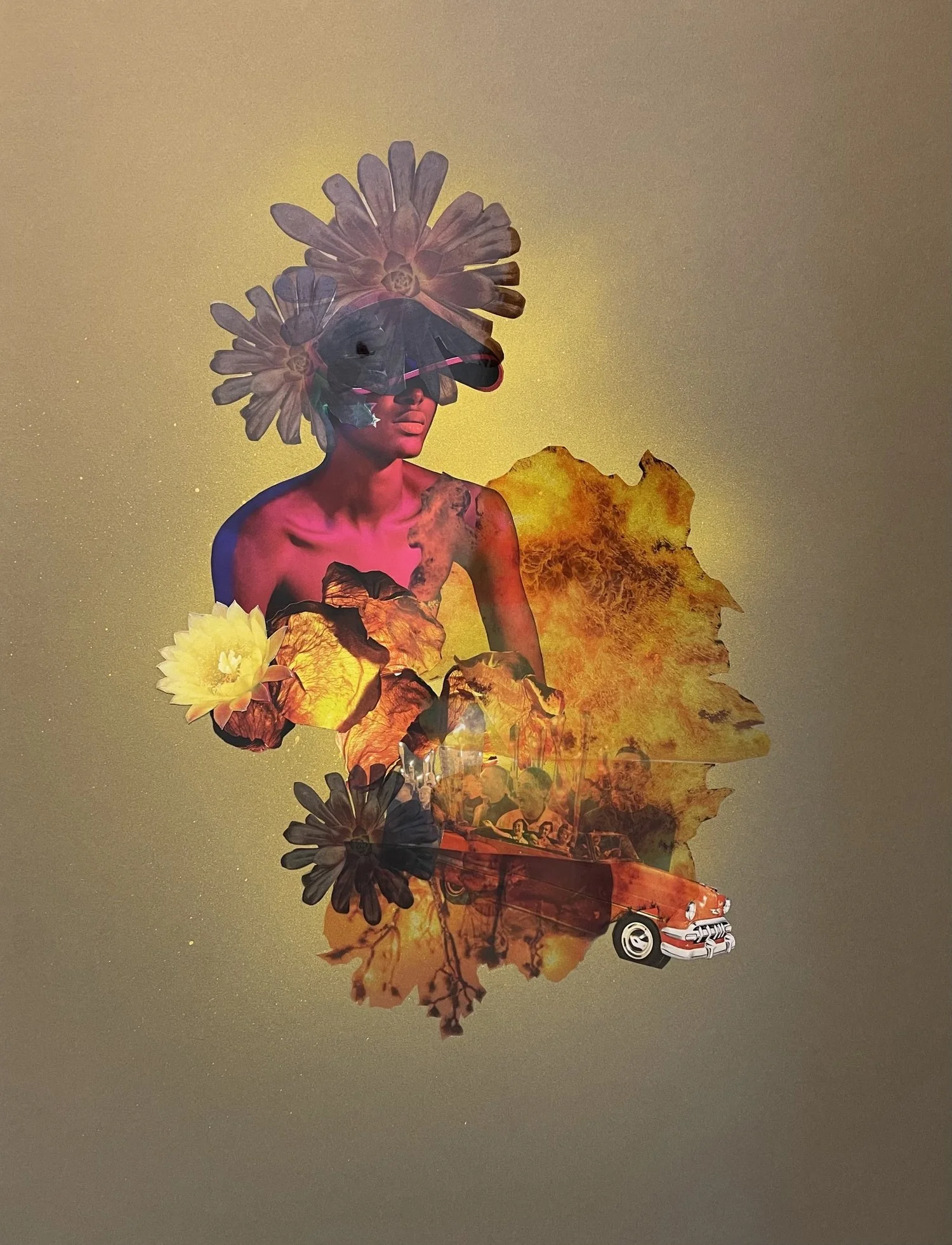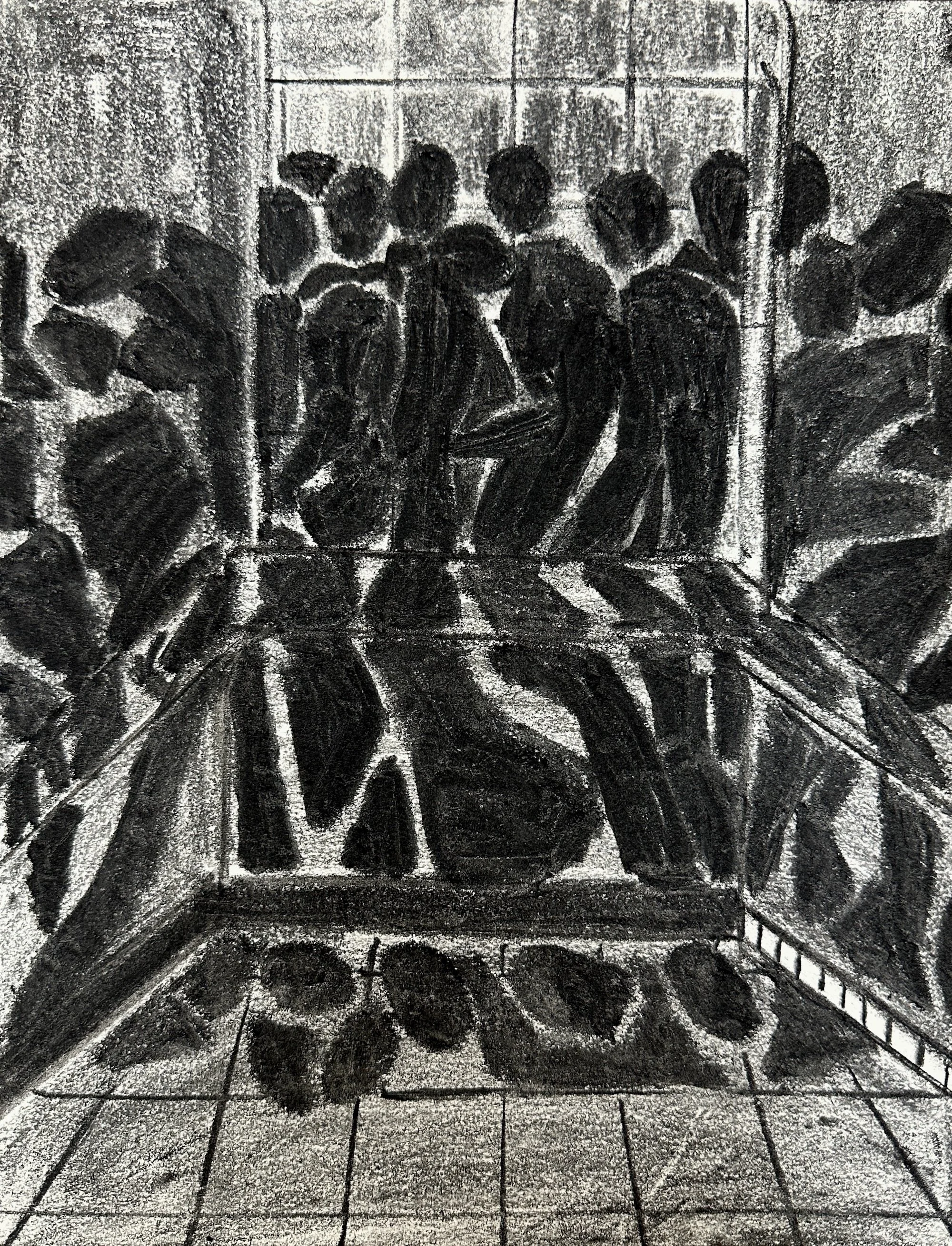Relearning Fire
By Raka Banerjee
How does one write about renewal without writing about loss? 2024 was the year I learnt to fall apart. When life was beating us down, all I could do was hunker down and hope to salvage what would remain after the storm. We are not at the after yet. This is a prayer in the direction of after. It is my sincere wish that you find no resonance with what I write here.
This image was taken in old Delhi where my mother and I were shopping for glass bangles in August 2023. My brother was to leave for his studies abroad, so the family had gathered to spend a week together before his departure. The next time he came home, in June 2024, was to be with maa during her chemotherapy.
Image description: Two forearms: above is the author’s wrist with red glass bangles and below is her mother’s wrist with gold glass bangles.
January 2025:
Last night I was revisiting the checklist before bed: gas—extinguished; switches—killed; balcony door—padlocked; front door—latched. My attention fell on the small rug in front of the shoe cabinet. It's a few years old. One side of the rug has started unravelling one weft at a time. Someone noticed the last one and cut it out of its hanging fate. I cut off another bit earlier this week. And yet another weft was already on its way out of the weave. At this rate, the rug would be a pile of threads by the end of the year. The thought filled me with despair.
The blue rug was a gift from my mother. We bought it together at a local crafts fair. The tiny image of a girl—perhaps a doll—woven into the rug’s centre made maa deem it appropriate for her daughter's use. The girl, she said, made her think of me. In a different city, almost two thousand kilometres away from my parents’ home, the rug became a small way of making a shared space my own. In the house I used to share with my extended family, I once found someone using it to make their dog comfortable on the floor. The sight enraged me. But I kept this to myself and spent the next day drawing out fur from the rug. I decided then to display it only when I had a space to completely call my own. I have since used it with immense care in the home I have created with my partner.
How was it then that it has started fraying? And how did I not notice it all this time? Why would anyone, especially me, think of cutting the threads when it would have made more sense to mend the weft? Why was my first instinct to cut? Do we not mend, repair, restore anymore? Instead, we cut the thing down to bits, throw it out when it's unusable, buy a new one to replace it. Never mind that it was a present someone lovingly chose for you. Never mind that it held the memory of a before time. Never mind that someone took great pains making the rug by hand so you can rub your tired feet on it at the end of a workday.
I owned a sewing kit; it must be somewhere in one of the drawers. I made a mental note of it: mend the rug tomorrow. Turn in for the night.
In bed I guilted myself into thinking about it some more. Had I become closed off to sentiments? Had I become so neglectful? Maybe, but what was a rug in comparison to half a dozen teeth, to an organ, to a headful of hair, to seven rounds of chemo, to thirteen rounds of targeted therapy, to twenty-one rounds of radiation, to ten months of treatment and counting.
***
October 2024:
He carefully peruses the flowers at the kiosk in front of the neighbourhood market. Perhaps sensing my gaze, he looks up and throws a smile. He is tired. The flowers are for my mother.
He walks back to the car carrying a polythene bag. Its contents a big loaf of bread, a pack of cigarettes, and a bright bunch of chrysanthemums wrapped in newspaper. The rain-washed city streets look darker against the flowers’ brightness.
Even at the start of this year, it was my mother doing this task of domestic maintenance. She has been doing it since we moved to the new city over twenty years back. But on this rainy October evening, she is at home waiting for my father to fetch me from the airport and bring back along with her daughter these supplies. Irregularities in her cells permeated into irregularities in our habits.
Lately I feel their boundaries are blurring. Baba melds into maa's habits, maa melds into baba's. How else would he have learnt to look at me with that gentle smile.
***
January 2025:
I opened the wardrobe this evening and the scent that wafted out brought me back to the teenage bedroom I used to share with my younger brother. The smell of fresh laundry and insect repellent bar mixed with the scent of cheap plywood furniture took me back to an evening in the late 2000s. Our parents were at work and I, perhaps sixteen or seventeen at the time, was in charge of supervising my seven or eight-year-old brother and the assembly of the new wardrobe. The plywood wardrobe looked more modern than our old almirah. Once assembled and placed against the yellow walls of the government quarters, the wardrobe seemed to me the first step in our long journey towards integration in the new city. Having just moved from a foothill town, with no relations and hardly any friends, getting a modern-looking wardrobe meant acceptance into the new society’s fold.
Seventeen years later, each day is once again about adjusting to a new normal. Its amorphous borders expanding and encroaching into every sacred space, every piece of home held onto for a semblance of safety. A new normal everyday: six teeth uprooted in a day? normal; an organ amputated? normal; having to go on as though it is okay to be at the hospital four days out of seven? normal. I am tired of adapting to the nebulous world of the normal. I have no room in my heart for any more grief. If I could only hold on to my mother’s body tight enough to stop all this loss from flying out of her like birds at dusk. I am grateful she is getting better. But what do I know of the visions that haunt her when she wakes up screaming that she is seeing blood again. Or the recurring dream about the operating theatre. How many needle pricks are there between illness and wellness. Make the loss stop. Make the anguish stop. I am tired of having to see her live this close to the scalpel. Later in my sleep I tell myself: cell by cell, I will return myself to her.
***
July 2024:
My mother broke down better than Hemingway the essence of her travails: "the chemo was over in four songs." Everyone I like and count as my closest knows what a strong and beautiful soul my mother is. They are mystified by her approach to life, her zest for it, and her deep practice of being present. I tell anybody that will listen what a great woman I come from, and they long to meet her in person to see what she is really like. But she is only common. Common like a rock is, like a tree is, like the waves on the beach. Common and profound. Elemental and fundamental.
She says over the phone rather plainly, "I'd like to get my head shorn before the third chemo, doctor says my hair will start falling out soon." I suggest we book an at-home service online, and the rest of the evening I foresee myself gathering strands of her hair—unshorn since girlhood—to put in my amethyst pendant. My talisman.
***
January 2025:
An Instagram post asked no one in particular: “if someone were to give you a box containing everything you have ever lost, what would you first look for?” A plastic tumbler, I thought. I would look for the plastic tumbler with a bubble-like lid that my mother gave me when I was a little girl. It was yellow with orange feet. An ordinary cup that my mother made special by filling it up with all kinds of candy she would find in the town shop.
She knows exactly how to accentuate the joy and the beauty of the everyday. She sparked in me the feeling of wonderment for the ordinary each time she took me to the local bakery to see how bread was made, or when she would pluck a hyacinth flower from the pond on our way back from school. Every little thing could be fascinating, even within its rather plain context, if you only cared to look. It took me many years and life lessons before I could begin to understand what strength and expansiveness of spirit this way of approaching the world actually requires of someone. The need to elevate the mundane with attention and care wasn’t because we used to live in a small town without access to more obviously refined things. My mother can make life artful irrespective of her life circumstances. Her joyful practices demonstrate the stubborn will to break through concrete and sprout against all odds. “We will make good of what we have”. I meditated on her words and for a while it seemed like we had more control over our lives than I had felt in the last year.
***
June 2024:
You have to allow yourself time to fall apart. Let the cobwebs gather in the corners. Ignore the pool of dead flies. This dust you see around the vase is harmless compared to what we breathe in the city. Instead, observe the golden yellow of mangoes. The sticky sweet smell of the season's jackfruit behind glass shutters. The last of the ice apple on the vendor's cart. The dog cooling itself on a puddle. While you take in the blows life is throwing at you, make sure to peel the litchis while their red shells are still pliable. Eat them over the sink like baba does when he cannot sleep at night.
What has all my worrying come to? I could not prepare. What good did my prayers do? This city has only taken from us. Battles that need to be fought will have to be fought; life will make us. But who will tend to my mother's garden. Or her wardrobe that now needs reorganizing to accommodate her changed body.
The mundane ceases to be trivial. These everyday acts keep us tethered to life. In moments lacking a tactile preoccupation, I feel the weight of boulders on my heart, which is being slowly bled out like pomegranate seeds under a careless nail. Does one let the heart go numb to avoid pain? Do I not think about what is painful? I never believed these acts necessary for survival before. Keeping the heart pliable is important. You take life’s beauty and the inconveniences, even the horror, and hope to see meaning in their arbitrariness.
***
This image is from December 2024. I clicked it right before leaving for a much-anticipated wedding celebration. Life looked very different when we had received the invitation in January 2024. Throughout her treatment, we kept looking forward to the wedding - planning our attires, our presents for the newly-wed - like it was a milestone we had to reach. On the occasion, maa had painted my palm with henna, and I hers. Another small act of joyful reclamation of life.
Image description: Two open palms, both with henna designs: the author’s above and her mother’s below.
In the last year, life turned unfair in ways I had only seen from a distance. I found out how self-centred I could be. I made the situation about myself—the fear, the possibility, the statistics. I worried too much about how likely I could go through what she was going through. Of course, only in my head. My fears, the shame around what I feared, felt like a clenched fist in my chest. Thoughts grew so incessant, so loud, I feared my touch could transfer ill-will to others. I began to sleep alone.
Like an obedient dog, I have been training myself to be mindful. Ground yourself. Give yourself a task: look for five objects, try to identify four sounds, identify three colours, imagine what two of them would smell like, name a sensation in your body. 5, 4, 3, 2, 1. Yet, between tasks only despair and ill-thoughts fog my mind. I hesitate greeting my partner returning from work—I cannot taint him with my gnawing thoughts. The woman I see standing in my pupil is tired. I switch on the table lamp on my bedside and try to rest my mind, determined not to sleep at an ungodly hour of the evening. I sleep at an ungodly hour of the evening. I wake up with nothing but the determination to make a cup of lemon tea.
Sorting through unread emails in my inbox, I sip the cooling tea. I am here on the dining table. It’s at the heart of the house. I can see the living room out of the corner of my right eye. The kitchen is right next to my line of sight. It’s dark but the light right above the dining table illuminates the edges of the kitchen counter. There is a light breeze outside, winter is slowly setting in. I look up from my screen and see the sunflowers I bought last weekend. Their robust stems smell of the wild. Their deep green leaves nestling around the flower brings to my mind the shape of a healthy cauliflower. Its green segments against the light, carrying chlorophyll, making cells. Big, bright flowers. The contrasting yellow and black stand out in the otherwise muted colours of the room. It merely draws replenishment from the water that I change every day. Yet it looks so happy and alive. For a moment, I am touched with a growing sensation of fullness: I am still, I am savouring the tea I have made for myself, I am sitting at the table that is just the perfect height, I am bathed in a light that is neither too sterile nor too harsh, I am able to write about it. I am grateful for today. When I write this, it's to relearn hope. I want to relearn resistance. I want to relearn not giving in. I want to relearn fight. I want to relearn fire.
Raka Banerjee is on a journey to find her most authentic voice through writing, reading and creating. Her personal essays and creative nonfiction have appeared in The Tiger Moth Review, Kitaab, Borderless Journal and elsewhere. She is an academic by training. Raka creates handmade and upcycled products for her label Dui. She lives in Bengaluru, India.





‘It was early January, and the snow had come down that day like an epiphany.’ – an essay by Max J. Nam.